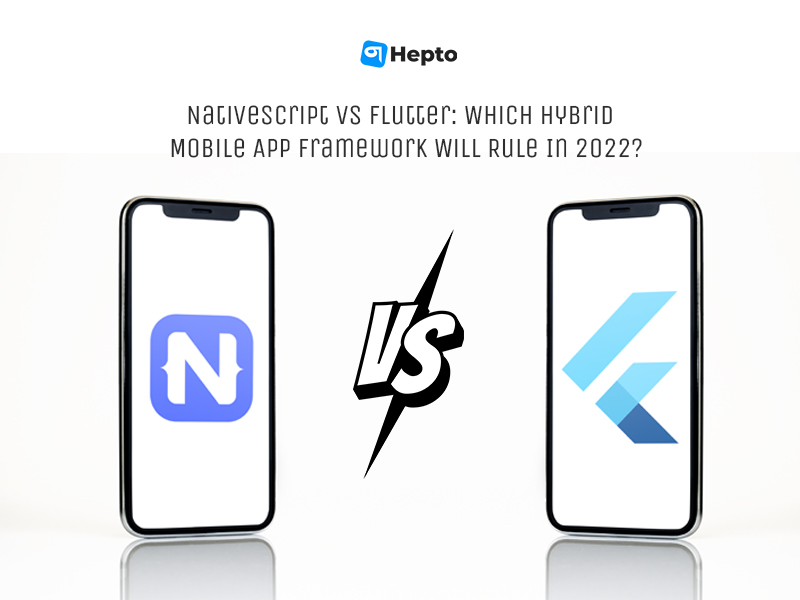NativeScript Vs Flutter: Which Hybrid Mobile App Framework Will Rule In 2022?
The phenomenon of mobile applications dramatically affected the world of development. Deciding on a framework with extreme features is not as simple as it appears and making the right choice between NativeScript vs Flutter can be overwhelming! Because dozens of advanced technology frameworks have made their mark in the coding industry and anyway from the given choices that can’t count on our fingers, making a choice is as it is difficult. It is hard to pick between Flutter and NativeScript because both frameworks provide a great user experience and are fundamentally powerful. Both are similar in some ways, but they differ in others, such as architecture, system components, size, development cost, and so on. In this blog, we will help you to understand what is Nativescript and Flutter and also guide you on how to choose one of the two for building a mobile app.
What is NativeScript?
NativeScript is an open-source framework that uses JavaScript to create cross-platform applications for iOS and Android operating platforms and it is able to convert between Angular, Vue JS, and TypeScript, allowing it to construct genuinely native apps. The Nativescript framework provides JavaScript access to the native APIs, user interface, and rendering engines of iOS and Android. By using JavaScript or TypeScript, you can create one project that builds into an iOS or Android app with a completely native user experience.
Market Usage of NativeScript
According to recent statistics, NaiveScript is now used by 5% to 11% of developers for Cross-platform App Development. And almost 28 per cent of developers have been using NativeScript for cross-platform mobile applications development for more than a year.
Use Cases of NativeScript
Apps with a high level of server connectivity and can interact with the device’s default apps.
- Real-time Applications
- Geolocation Apps
- Streaming Video or Music Apps
- Simple Gaming Apps
The Key Advantages of NativeScript
NativeScript has emerged as a staple framework for building powerful, engaging, and high-performance native apps and offers several advantages to app developers for developing mobile apps.
- Free and Open Source
- Native User Experience
- Reusability of the Codebase
- Lower Learning Curve
- Access Native APIs
- Strong Community Support
What is Flutter?
Flutter is an interface-building open-source framework created by Google to help developers create apps for the platforms iOS and Android. It is created by Google that builds, tests, and deploys multi-platform applications including mobile, web, and desktop all from a single codebase which is a fast, object-oriented programming language. Flutter is a comprehensive framework that comes with widgets and tools that are fast, attractive, and customizable.
Market Usage of Flutter
According to recent statistics, Flutter is popular with 68.8 per cent of the developing world and used by 39 per cent of the world’s population to create cross-platform mobile applications. Because of its high popularity, 7.2% picked Flutter for its library and tool.
Use Cases of Flutter
Apps that interact with system-level features and flexible user interface with high-level widgets
- Advanced operating system plugins
- Flutter MVP mobile application
- Reactivate apps
- Provides high-performance apps by skipping the rendering engine
The Key Advantages of Flutter
Flutter is a bit different from its competitors in some key advantages that make it better than other frameworks.
- One codebase for all platforms
- Own Rendering Engine
- Faster code development
- Rich Libraries
- Enormous UI customization potential
- Increased Time-to-Market Speed
- Fast testing with hot reload
Concluding the Battle – NativeScript vs Flutter
Being very competitive coding hybrid frameworks, both Flutter and NativeScriopt have their own set of limitations and strengths. The hybrid nature of both Flutter and React Native reduces time-to-market and their third-party libraries and ready-to-use components make both platforms more efficient to use to build your app. Both Flutter and React Native offer more than just speedy development, they can reduce project costs as well so it is best to consider each on its own merits while keeping in mind what would be the most suitable for your app. We sincerely hope this blog will help you make a decision about your app development. Hepto Technologies is a leading mobile app development company that strives forward to empower your business through our optimization efforts and produce something innovative and unique cross-platform mobile apps that makes your business stand apart from the ever-changing competition.
